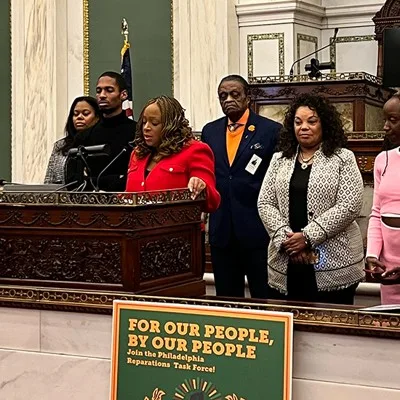
Philadelphia made history in the commonwealth last year when it formally established its Reparations Task Force. Led by the city’s chapter of the National Coalition of Blacks for Reparations in America, the city plans to name members of the task force from around the city this month, with descendants of enslaved Africans encouraged to apply for an open position with the board. The task force will study and develop reparations proposals and programs for Black Philadelphians, with a focus on elevating and protecting the human rights and human potential of Black Philadelphians. To see what the City of Brotherly Love and Sisterly Affection could expect soon.
In Harrisburg: There hasn’t been too much action on reparations at the state level in Pennsylvania. In 2019, Democratic state Rep. Chris Rabb introduced a co-sponsorship memo outlining his plans to introduce a four-part reparations bill that – in addition to formally apologizing to Black Pennsylvanians and people of African descent “for the complicity of Pennsylvania’s three branches of government in white supremacist efforts” – would provide “significant financial redress to African-American residents of Pennsylvania.” In a 2021 op-ed published by GoErie, Rabb stressed that reparations are not a new idea in the U.S. “Many groups have received reparations, including Japanese-American survivors of internment and Native Americans who were indirectly compensated for their lands stolen by the U.S. government,” he wrote. The legislation, however, has yet to see any action in the General Assembly.
In Evanston, Illinois: In 2019, the City of Evanston, Illinois became the first city in the United States to approve a government-funded reparations program, per Northwestern University. In an April 2019 memo, then-City Clerk Devon Reid wrote that research by the clerk’s office found “multiple instances of racial discrimination perpetrated by the City of Evanston” throughout history. That includes the relocation of Black homes, the redlining of Black communities and discrimination within city departments. In November 2019, the city committed $10 million to fund housing and economic development reparations programs for Black Evanston residents – a sum that was funded with revenue generated by a 3% tax on cannabis sales in the city. According to a survey conducted by Northwestern University, Evanston residents largely support the program, with 70% of white respondents viewing the city’s program as “good public policy” and 64% of Black respondents also showing support for the program.
In California: Last year, a California task force designed to study the issue of reparations for descendants of enslaved people issued a 1,080-page report with dozens of policy recommendations that, according to the report, would begin “the long-overdue process of providing true reparations for African Americans.” In January of this year, California lawmakers followed up on the report’s recommendations by introducing a reparations bill package that includes several reparations proposals. According to the California Legislative Black Caucus, one measure, if passed, would create a mechanism to restore property taken during race-based eminent domain claims when possible. Another bill in the package would establish a grant program for students descended from enslaved people who are enrolled in career and technical education programs. Perhaps the most high-profile measure in the package is a proposed amendment to the California constitution that would allow the state to fund programs for “specific groups” of people.
Elsewhere: Outside of government efforts to explore the issue of reparations, some seminaries and universities have taken direct action on the issue. At Princeton University, the Princeton Theological Seminary in 2019 dedicated $27.6 million to scholarships, curriculum reforms and other initiatives to atone for the seminary’s complicated history with slavery. That includes 30 scholarships and five doctoral fellowships for students who are descended from slaves or are members of underrepresented groups, according to Princeton Alumni Weekly. In September 2023, the Descendants Truth & Reconciliation Foundation, a nonprofit devoted to combating the impact of racism, announced that it received $27 million in new contributions from Georgetown University and the Jesuits that will go toward supporting the education of descendants of enslaved people, supporting descendants who are elderly or infirm, and investing in racial healing and reconciliation efforts in communities and organizations.

